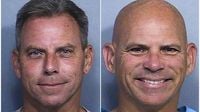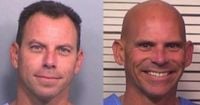Thirty-six years after the infamous murders that shocked Beverly Hills and the nation, Erik and Lyle Menendez are once again at the center of a legal and cultural storm. On August 21 and 22, 2025, the Menendez brothers, now in their mid-50s, will each face separate parole hearings—events that could determine whether they remain behind bars or finally walk free after nearly four decades in custody.
The Menendez brothers were convicted in 1996 for the brutal 1989 shotgun killings of their parents, Jose and Kitty Menendez. At the time of the crime, Lyle was 21 and Erik only 18. Their trial, which played out in two highly publicized proceedings, captivated the public with its blend of privilege, violence, and allegations of family dysfunction. The brothers claimed they acted in self-defense after enduring years of sexual and physical abuse by their father, a narrative that was rejected by the jury, leading to life sentences without the possibility of parole.
Yet, the story did not end there. According to KABC and ABC News, recent years have seen a resurgence of interest in the Menendez case. In May 2023, the Peacock docuseries "Menendez + Menudo: Boys Betrayed" aired new allegations from a former Menudo band member, who claimed he was raped by Jose Menendez when he was 14. This revelation, along with the discovery of a letter Erik wrote to his cousin eight months before the murders detailing alleged abuse, prompted the brothers’ attorneys to file a habeas corpus petition seeking a new trial. The petition argued that this new evidence, which had not been available during the original trial, corroborated the brothers' longstanding claims of abuse.
Public fascination was further stoked by the September 2024 release of a Netflix crime drama about the Menendez brothers, which reignited debate over their guilt and the fairness of their sentences. The renewed attention led more than two dozen relatives to form the Justice for Erik and Lyle Coalition, urging authorities to revisit the case and consider the possibility of a new trial or resentencing.
In a significant legal shift, Judge Michael Jesic resentenced the brothers in May 2025 to 50 years to life in prison—25 years to life for each count of first-degree murder—following a recommendation made in October 2024 by then-Los Angeles County District Attorney George Gascón. This resentencing, which took into account their youth at the time of the crimes and new evidence of abuse, made them eligible for parole under California’s youth offender laws. During the resentencing hearing, both brothers appeared via video from prison and offered emotional admissions of guilt and apologies to their family.
"I killed my mom and dad," Lyle Menendez told Judge Jesic. "I give no excuses." He went on to admit to perjury during the 1990s trials and apologized for the years of lies and the pain caused to his family. Erik Menendez echoed this remorse, stating, "I committed an atrocious act. ... No justification for what I did." He added, "I will not stop trying to make a difference," referencing his efforts at rehabilitation and service while incarcerated.
Despite these admissions and a "stellar record" in prison, as noted by Judge Jesic, opposition to their release remains fierce. Los Angeles County District Attorney Nathan Hochman, who was elected in a tough-on-crime landslide in 2024, has consistently opposed the brothers’ parole and any bid for a new trial. On the eve of the hearings, Hochman reiterated his stance, telling Deadline, "The Menendez brothers have never fully accepted responsibility for the horrific murders of their parents, instead continuing to promote a false narrative of self-defense that was rejected by the jury decades ago." He added, "We have consistently opposed their release because they have not demonstrated full insight into their crimes or shown that they have been fully rehabilitated, and therefore continue to pose a risk to society." Hochman did, however, leave the door open to reconsideration, stating, "We will evaluate our final position based on the evidence presented at the hearing."
The parole hearings themselves are expected to be rigorous and closely scrutinized. Each brother will appear before a separate panel, with different parole board members and attorneys from the District Attorney’s office presiding each day. Family members, victims’ next of kin (who in this case are one and the same), and the public will have opportunities to provide statements. The parole board will weigh the brothers' criminal history, correctional records, and the impact of their actions before making a recommendation.
Should parole be granted, the process is far from over. The board’s chief counsel has up to 120 days to review the decision for legal or factual errors. If the approval stands, the case then lands on Governor Gavin Newsom’s desk, where he has 30 days to grant, reverse, or modify the decision. As Deadline points out, Newsom has not shied away from high-profile cases—he reversed the parole board’s decision to release Sirhan Sirhan, Robert Kennedy’s assassin, last year. If Newsom approves parole, the Menendez brothers could be released within five months of the hearings. If parole is denied, the brothers can request a review for factual errors or wait between three to fifteen years before reapplying, depending on the board’s ruling.
The Menendez family remains cautiously optimistic but realistic about the hurdles ahead. In a statement, they said, "As always, our family remains cautiously optimistic, grounding ourselves in the reality that California’s parole process is incredibly rigorous, with low grant rates. We respect that and know Erik and Lyle are prepared for that level of scrutiny." They also emphasized the brothers’ remorse and efforts at rehabilitation: "For more than 35 years, they have shown sustained growth. They’ve taken full accountability. They express sincere remorse to our family to this day and have built a meaningful life defined by purpose and service."
Meanwhile, outside the legal arena, the Menendez saga continues to spark debate about justice, trauma, and the power of narrative. Documentaries and dramatizations have fueled public sympathy for the brothers in some quarters, while others remain steadfast in viewing them as cold-blooded murderers. As DA Hochman put it, "While recent documentaries and films have drawn renewed attention to this case, parole decisions must be based solely on the facts and the law."
With the hearings unfolding remotely and media access tightly controlled, the fate of Erik and Lyle Menendez now rests in the hands of the parole board, Governor Newsom, and the unforgiving machinery of California’s justice system. The outcome could mark the end of a decades-long saga—or merely its latest twist.



